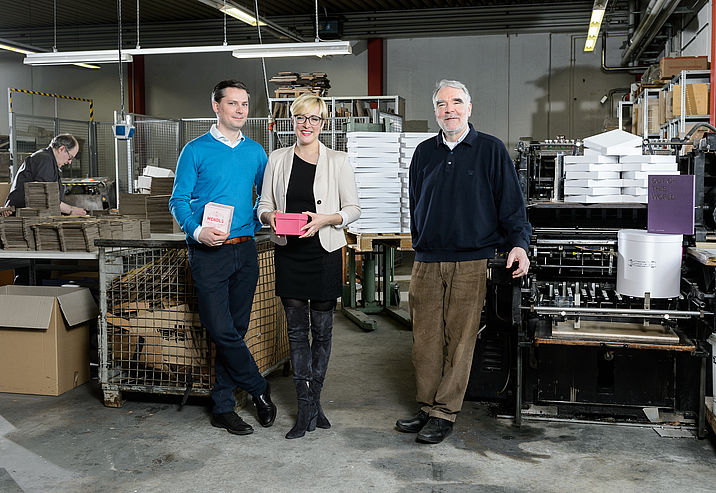News
„We have to watch out not to lose the originality in Berlin”
Fine cardboards – even the designation sounds splendid. We think of a packaging that makes us curious about what is hidden inside. At FAPACK in Berlin-Neukölln, we experienced how these cardboards are produced. We also got to know how to run a family business successfully and what kind of difficulties manufactories have to face in Berlin.
At FAPACK in Ederstraße the manufacturers still use machines that are partly 100 years old and still function like on the first day of production. They fold, bond and imprint. With a great deal of sensitivity unique packaging are produced that are so special that even director Wes Anderson implicitly wanted them for his film “Grand Budapest Hotel” and its “Konditorei Mendl”.
Authorized signatory Marcia Behrens grew up in the parental business and fully entered the business in 2006. “My parents left the decision of what I want to do with my life to myself. Most important to them was that I unconditionally back what I do. I believe that this was the right way.” Even though she mainly undertakes tasks of the management board now, Marcia Behrens still enjoys working in the production and operating the machines.
To enter the family business and work together with one’s father and mother is a brave decision. Family trouble caused by working together is not uncommon in other companies. “Honesty, trust and respect are essential to cooperation. My father is good at delegating responsibilities to me and he has always had full confidence in me which is often lacking in other family-run businesses.” Early on, Marcia Behrens helped out in her school holidays and she figured out soon that she wants to take over the factory. “In my family I am known as straightforward and unromantic” she laughs.
In 1869 FAPACK started as a bookbindery and hatbox manufactory. Ever since, unique packaging for premium products have been manufactured here that deserve a packaging on par with their own high quality. In cooperation with the client the ideal option is developed - starting from the box, through to the embossing and the velvet inlay. The packaging should reflect exactly what the client envisions. “That feeling when a client holds his individual product in a beautiful color und with the personal embossing in his hand is amazing,” Marcia Behrens raves.
Even though family Behrens is highly convinced of their products, they know the downside of running a manufactory. In the end, the question of who is willing to pay the price that quality demands remains open. Companies that choose Germany as business location, have higher basic costs and have to pay higher wages. Additionally, thoroughgoingness regarding material and workmanship inflict major costs that many companies do not want to spend due to a “the cheaper the better” mentality. “Sustainability and quality are nice words, but when it comes to the price, many possible clients state that they do not fit in their budget.”
But also Berlin as the business location shows only little interest in supporting manufactories. “Manufactories often receive praise along the lines of “How great that they exist. But nobody knows where we are coming from and the problems we are facing”, Marcia Behrens criticizes.
Berlin as “the capital of founding” offers a wide range of support that is tailored to individual needs. Manufactories, however, are excluded. The focus of the city lies on the promotion of the service and agency sector. “Ancient trades are not really supported. There is no longer any space for industry and production. Moreover the rents are way too expensive. To get subsidies, a manufactory has to plan ahead for 5 years, but nowadays that is quite a long time. “This goes beyond looking into a crystal ball”, according to Ms. Behrens.
Many of the historical yards that traditionally were home to craftsmanship and trade, are bought up by big real estate groups. Funding opportunities are rarely accessible to manufactories. Here in Berlin, politicians are needed to establish possibilities to preserve this part of Berlin’s culture. “We need to make sure that the originality that constitutes Berlin is preserved.”

